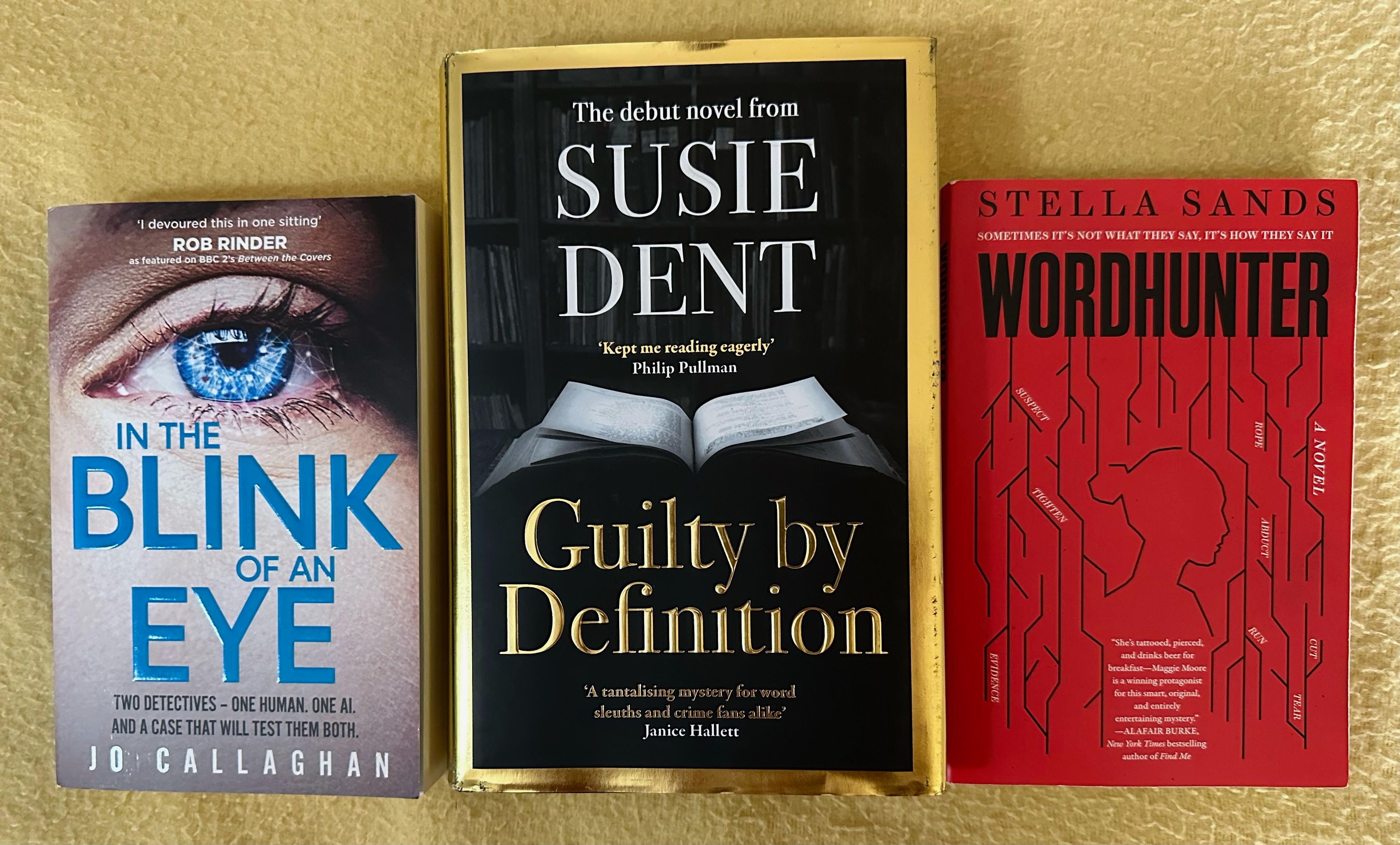Detecting, with words and AI
There may be too much exposition as we are introduced to Lock, but once things get going, the pace is irresistible and we are invested readers.
IYCRMM

These three novels are fine examples of bringing AI, the magic of words, and linguistic puzzles into the mystery/thriller conversation.
In the Blink of An Eye by Jo Callaghan
Winner of the John Creasy New Blood Dagger Award 2024, this first novel from Callaghan deftly explores the scenario of a human and AI detective working in tandem. Set in the near future, we meet DCS Kat Frank, a woman in her 40s. She’s assigned to a pilot program that pairs her with AIDE (Artificially Intelligent Detective Entity) Lock. Together, they are in charge of a team put together to handle the cold cases of missing persons reports. The statistic of how there’s a missing person report in the UK every 90 seconds is thrown in to highlight the frequency with which this happens. And when we do get introduced to Lock, he manifests as a hologram. Plus there are four versions—white man, black, woman, and Pokémon-type character—to better the reception the AIDE receives in the performance of its duties.
What Callaghan excels in is showcasing the life of the widow Kat Frank and her adolescent son, and the friction that exists in the relationship created between Frank and Lock. It’s instinct versus logic. Lock has no sense of context or humor. Everything is literal in his world. There’s also no emotion, and you cringe as you read about how he informs the mother of a missing 18-year-old that statistically her son is probably dead by now. Frank, with years of service under her belt, is at first dubious of the merits of AI in the police force, but begrudingly begins to appreciate the speed and logic that Lock applies to his analysis and his probability-influenced suggestions. There may be too much exposition as we are introduced to Lock, but once things get going, the pace is irresistible and we are invested readers.
Guilty by Definition by Susie Dent
Martha Thornhill is a senior editor at the Clarendon English Dictionary (CED) at Oxford, and think OED when we read CED. A brilliant older sister, Charlie (Charlotte), used to work at the CED until she mysteriously vanished back in 2010, and the family Thornhill has since been living under a despondent shadow. The mother passed away never knowing what became of Charlie. Now, after a decade living in Berlin, Martha is back in the city, living with her distant, distracted father. It’s when letters and cards filled with linguistic puzzles, written by someone signing as Chorus, arrive at the CED and the letterboxes of so many who were in some way connected to Charlie stir up memories and hint at dark secrets.
As befits the proximity of Oxford to Stratford-upon-Avon, the figure of Shakespeare looms large over the proceedings. Whether it refers to lexicographical inquiries, or the possible existence of a commonplace book of value, the Bard seems to haunt the letters and postcards sent by Chorus. In the end, Dent makes a great case of mixing her love of language and the etymology of words, with a succession of clues and a mystery we enjoy solving along with her protagonists. There’s the push and pull between those wanting to unravel the mystery and find out what really happened, against those whose prime motive is to keep those events from 2010 shrouded. Along the way, the lives of those involved in this world of words and dictionaries are exposed for our reading enjoyment.
Wordhunter by Stella Sands
Labeled a Brainiac Bitch at the age of 14, Maggie Moore was the sort of person who would think up how many nine letter words with N as a second letter could she compile. She lost her best friend, Lucy, at the time and, at 21, when the book really gets started, she’s asked to use her linguistic skills to analyze and decipher the harrowing notes left by a stalker/rapist. Maggie rides a motorbike, is tattooed and pierced, drinks two beers for breakfast, and is an overthinking mental mess, so it’s her genius with language puzzles that merits her this advisory position with the local police force. When her analysis helps Detective Jackson find the culprit, she’s asked to help a second time as the daughter of the mayor of a nearby town has been abducted. Initially, she refuses as it takes her too close to what happened to Lucy.
In her brilliant creation, Sands makes Maggie super interesting to follow, full of faults and eccentricities, but still a functioning savant whose analytical process astounds us. The investigative procedural part of the book is driven by Jackson, with Maggie at his side, and this works as well. The linguistic puzzles are described in detail, leaving us appreciative of the special skills it may involve. It may not point a finger at the criminal, but it is of great use in eliminating sets of possibilities and helping target the search for the culprit. In order to make Maggie a fuller, well-rounded character, there are telling chapters that deal with Maggie’s back story, and her encounters as a student at the local college. And there’s the quest to find Lucy, and understand why she simply vanished. A compelling new crime-solver.